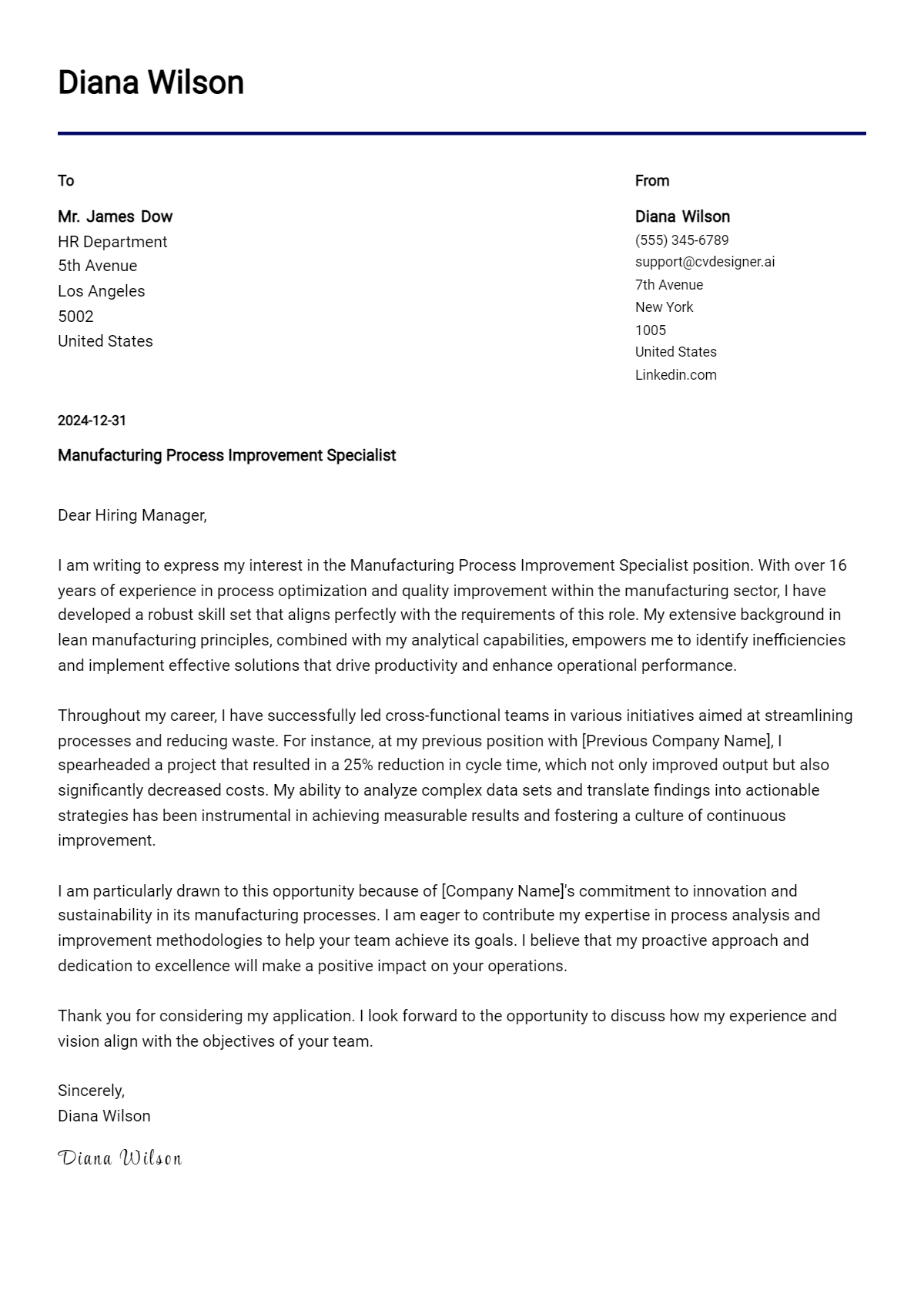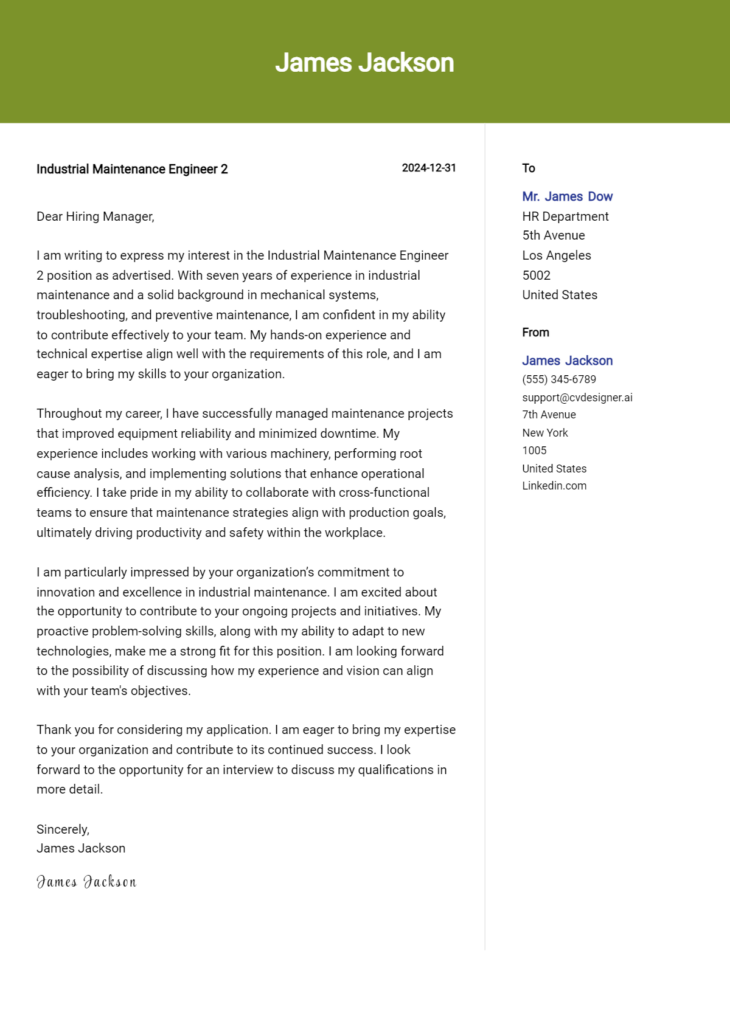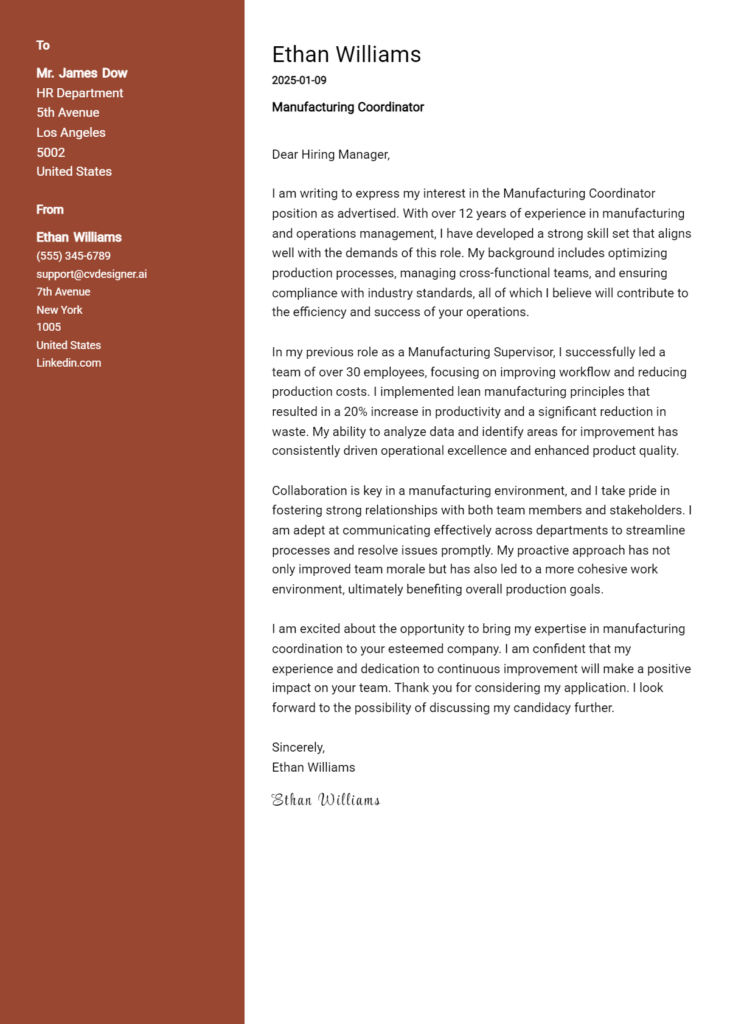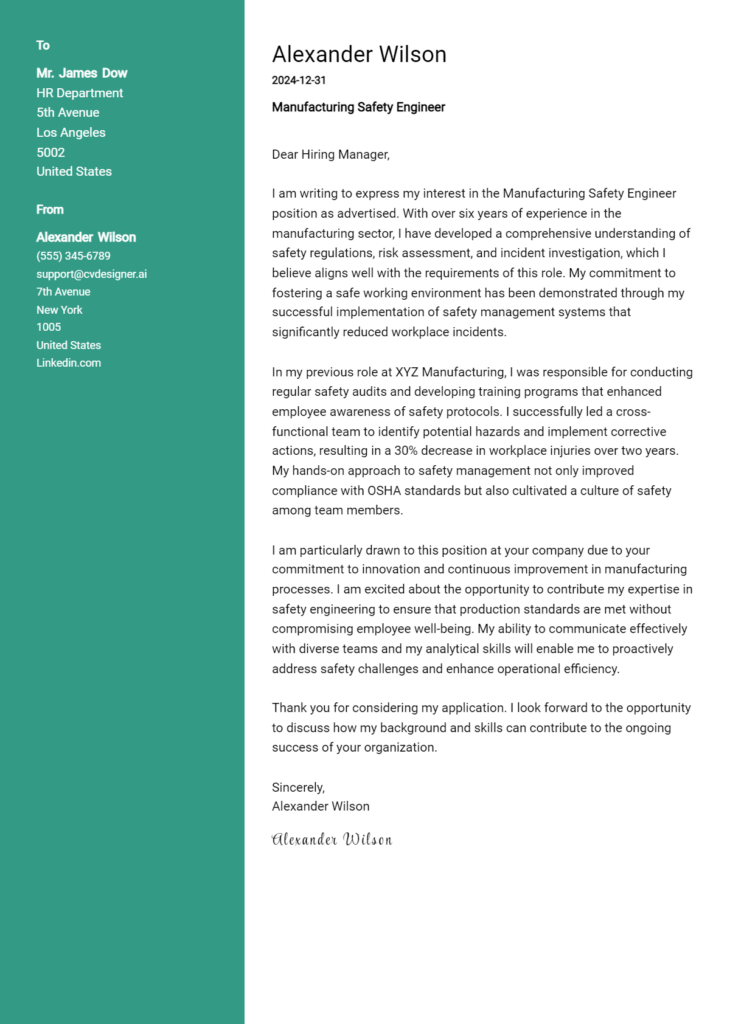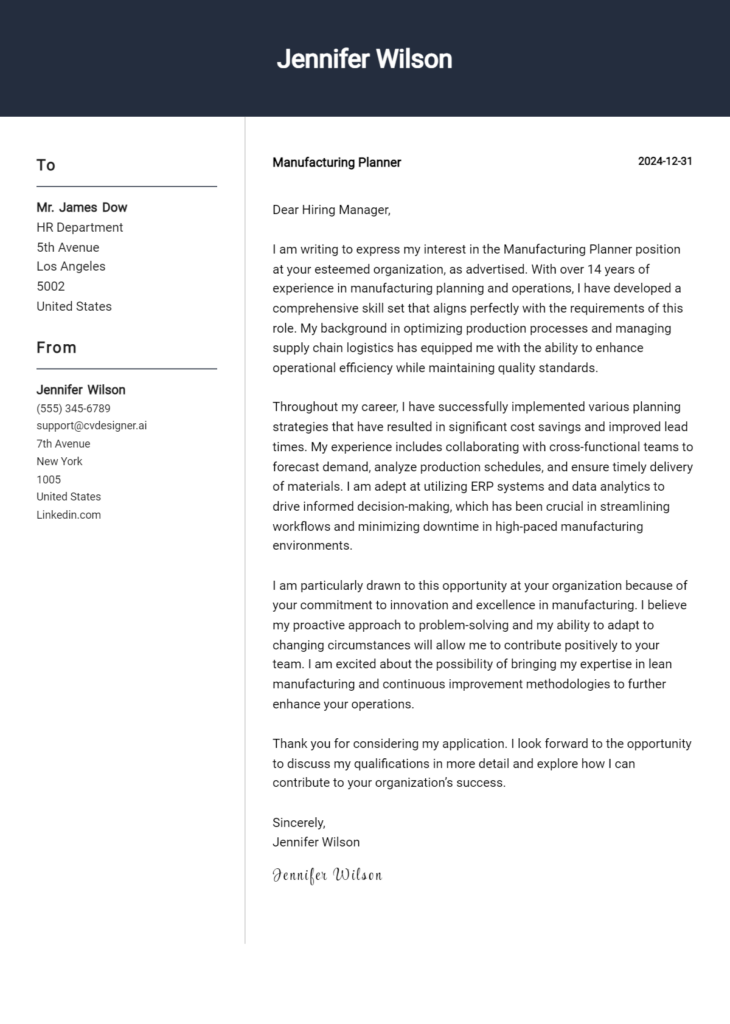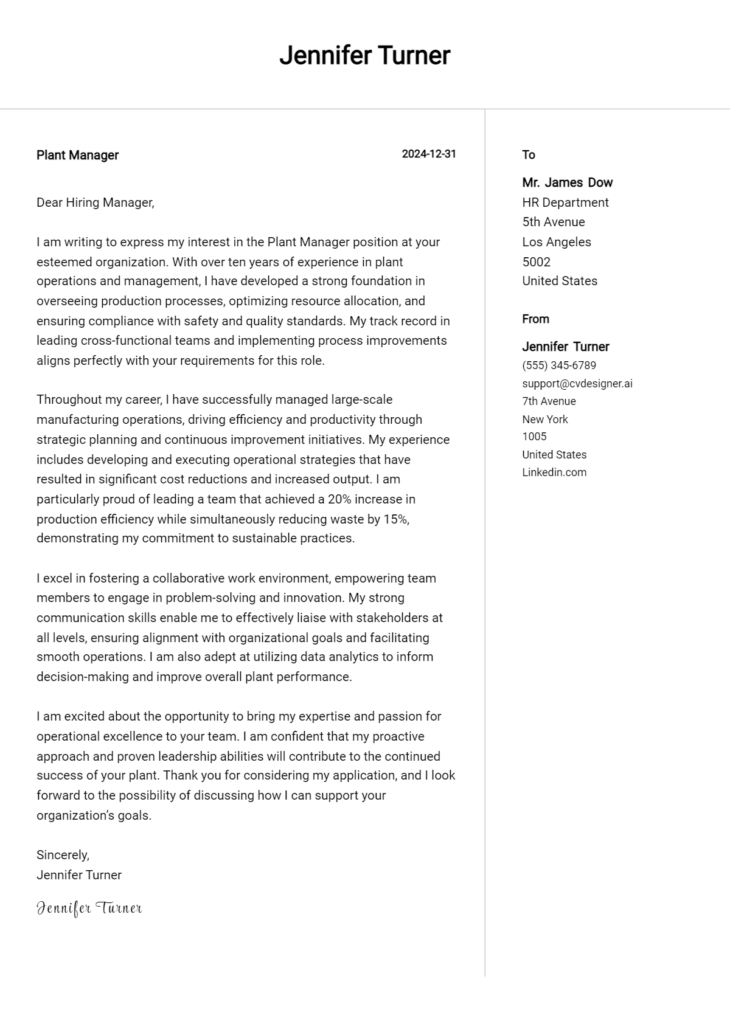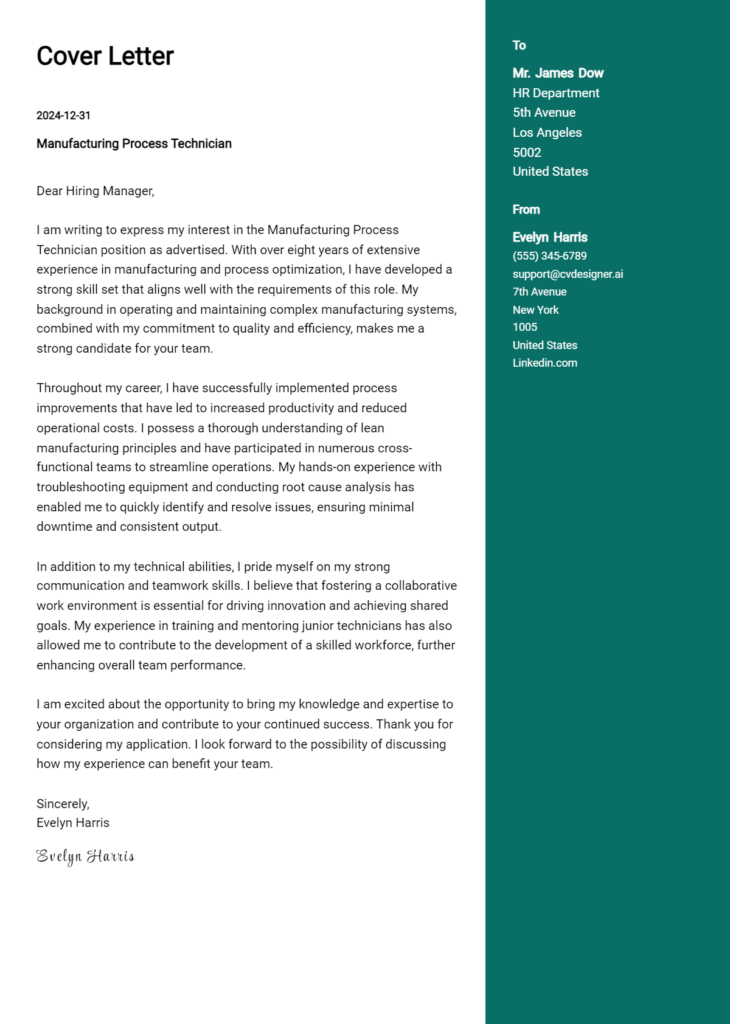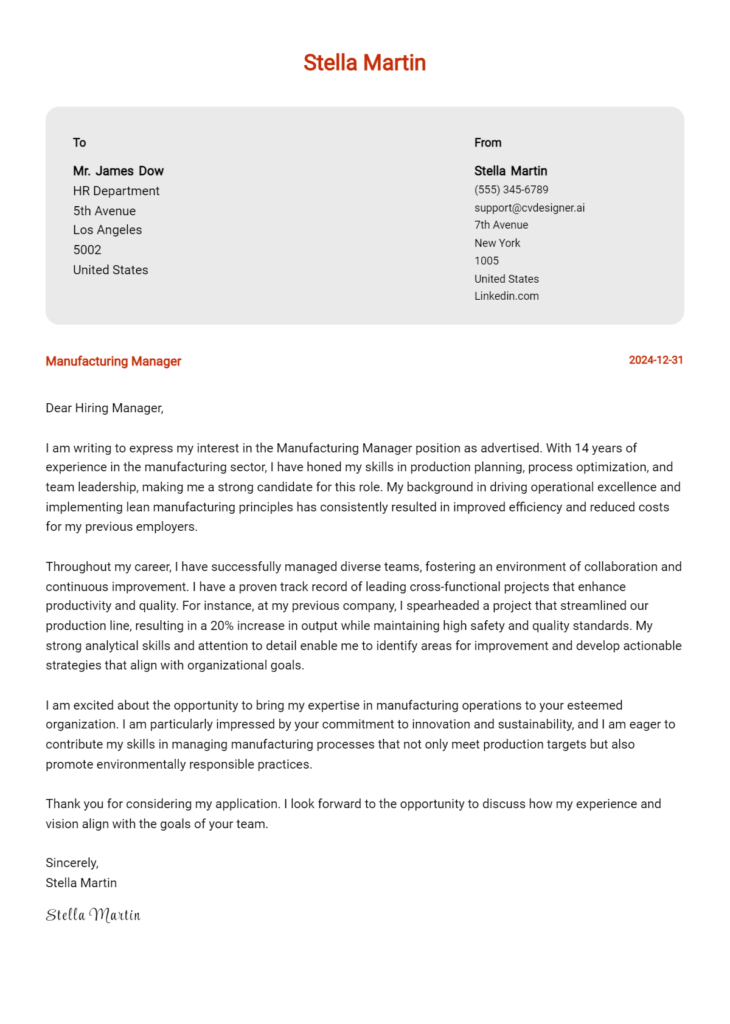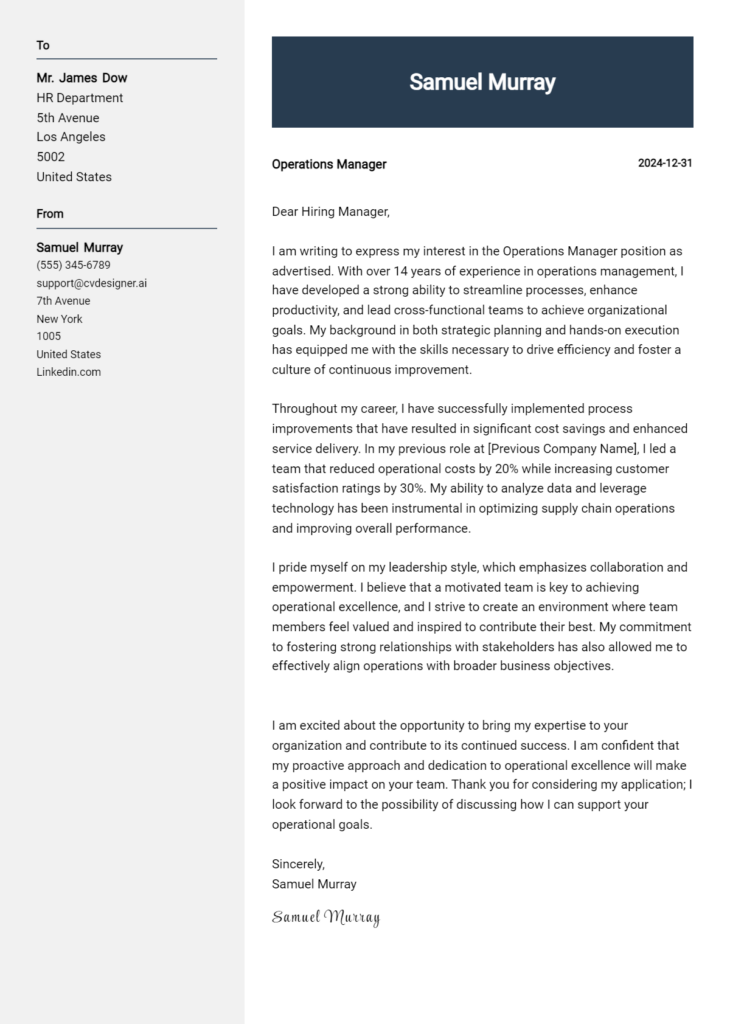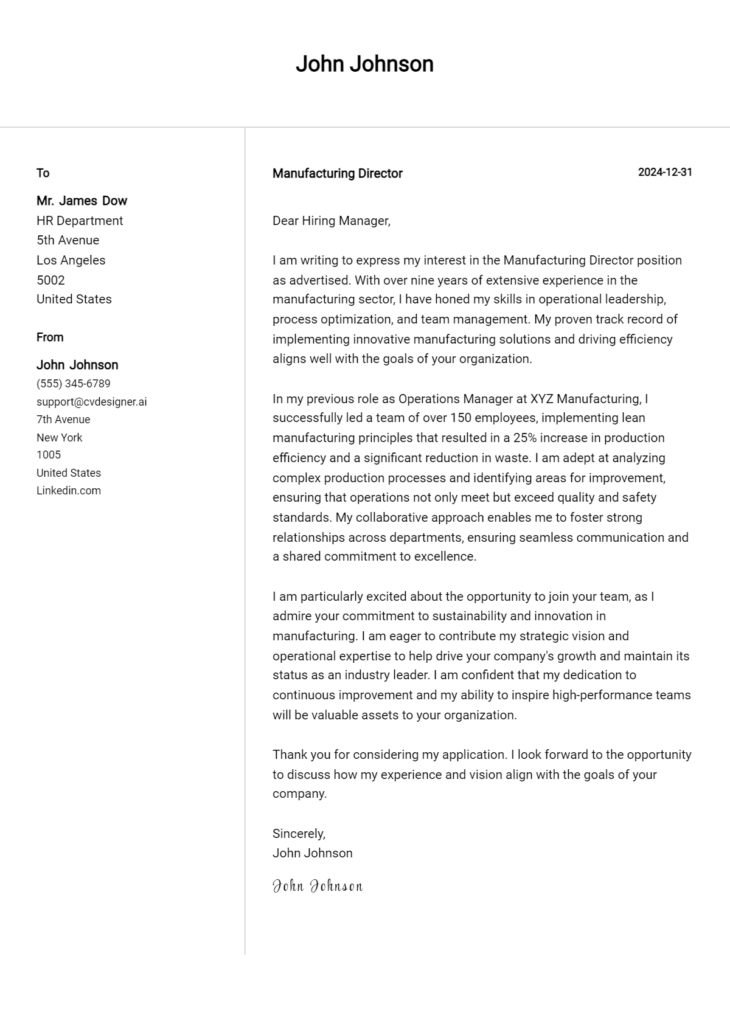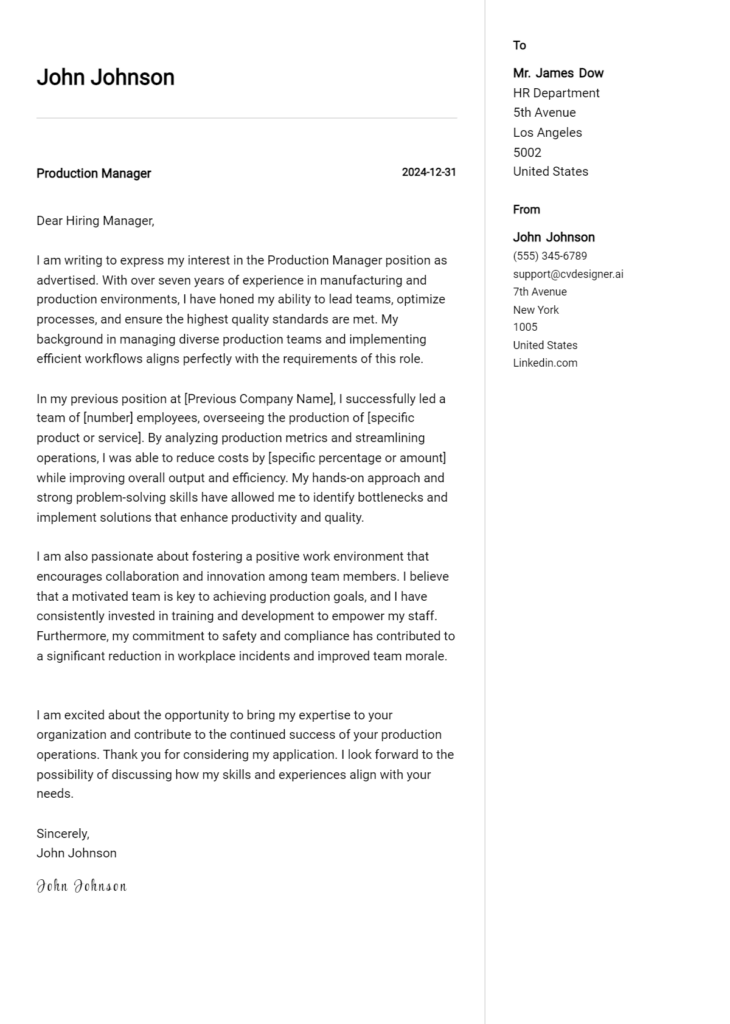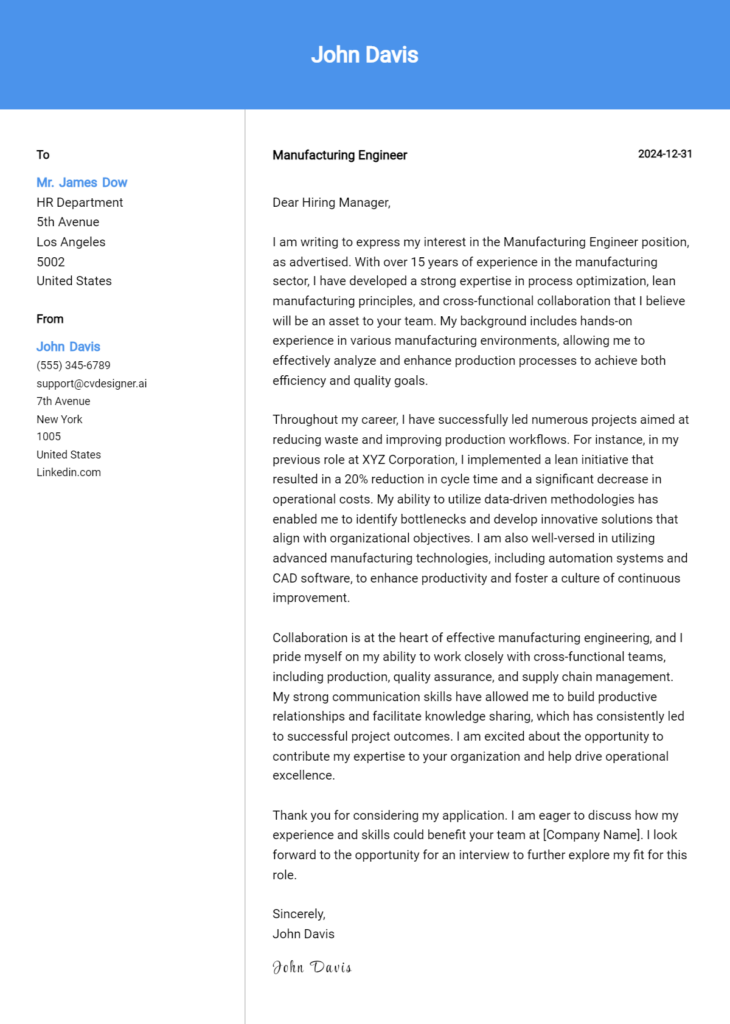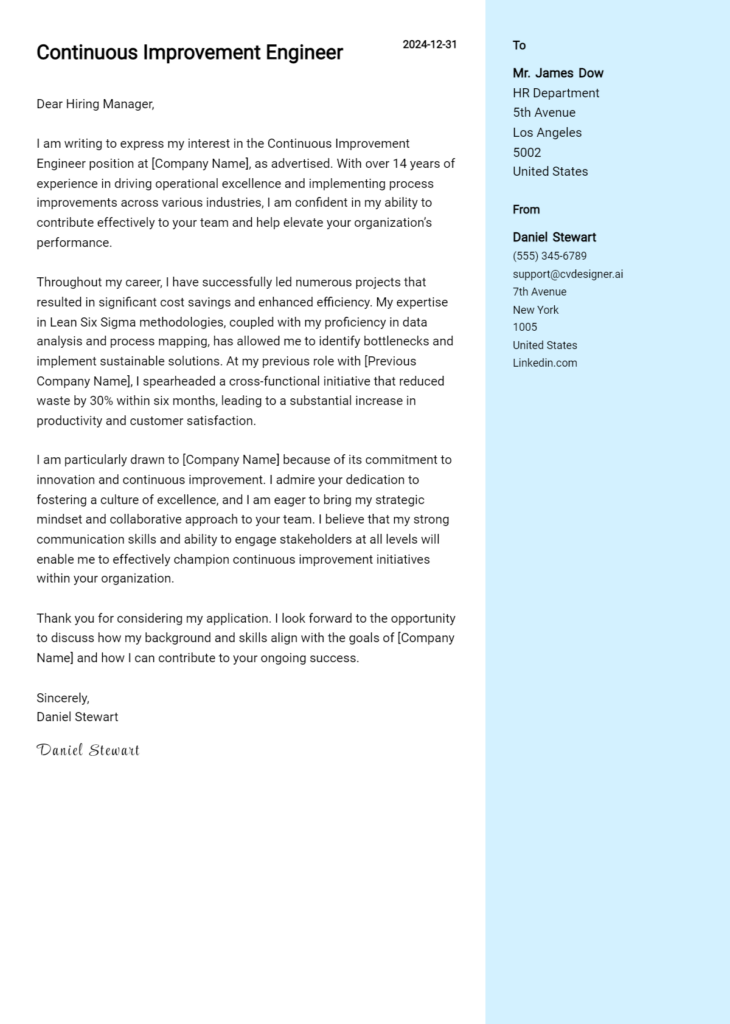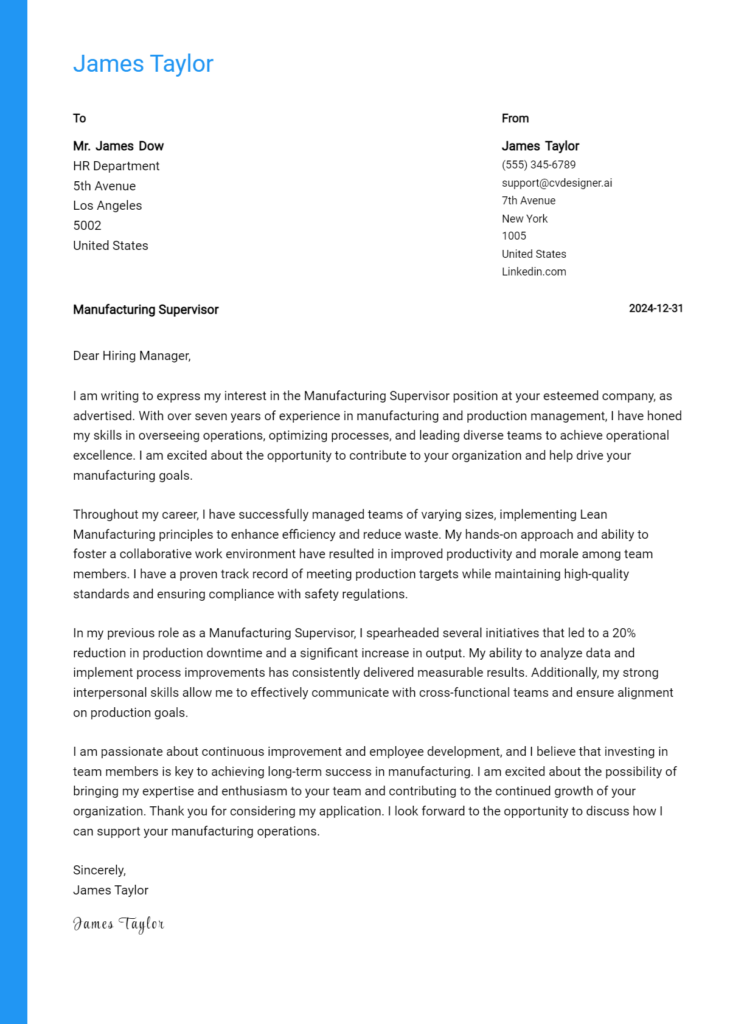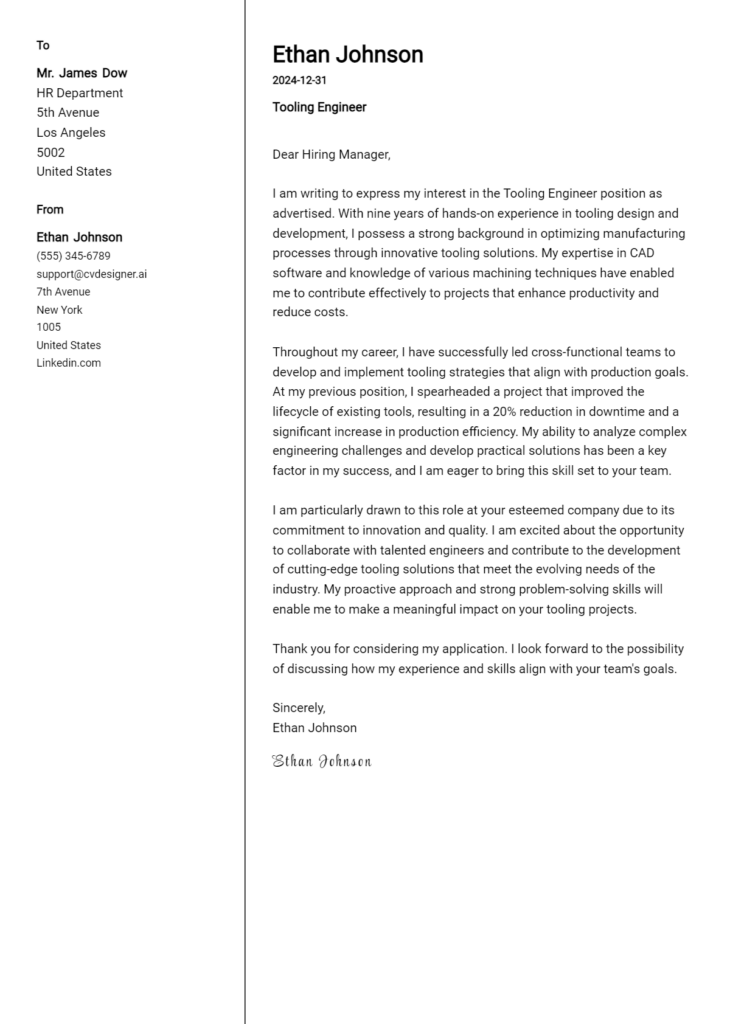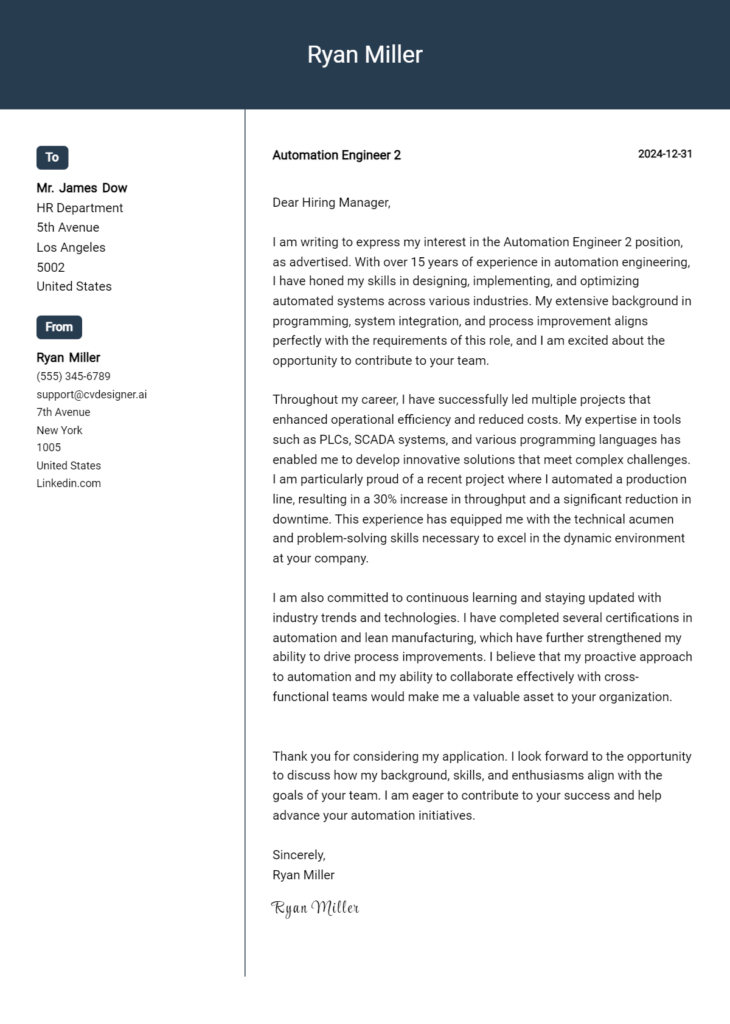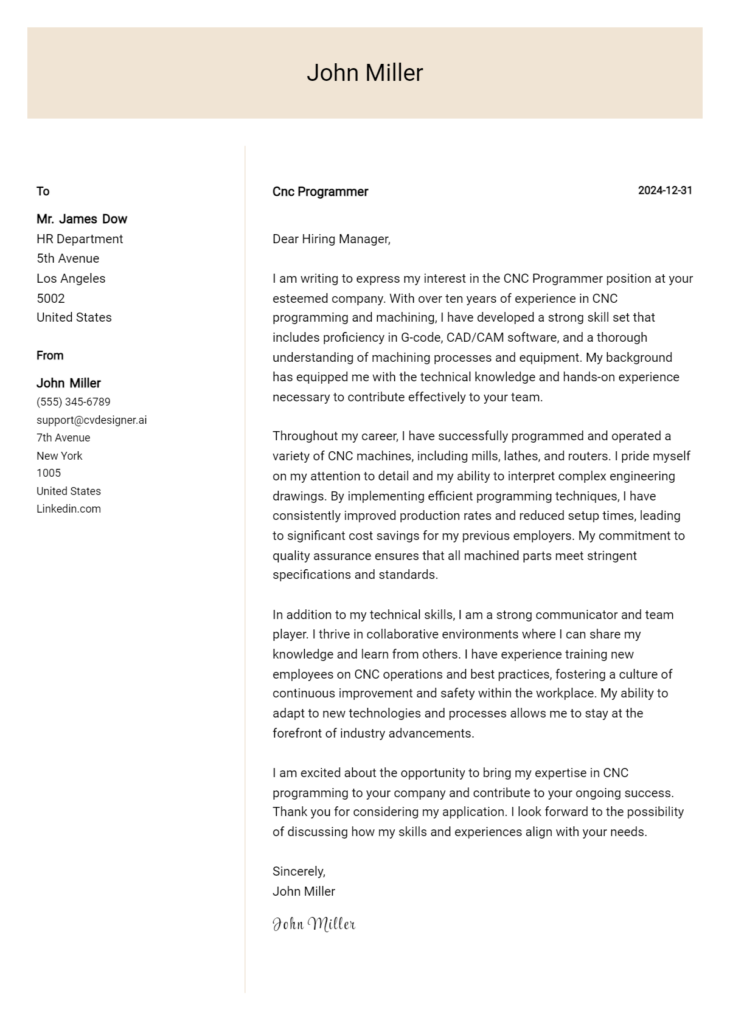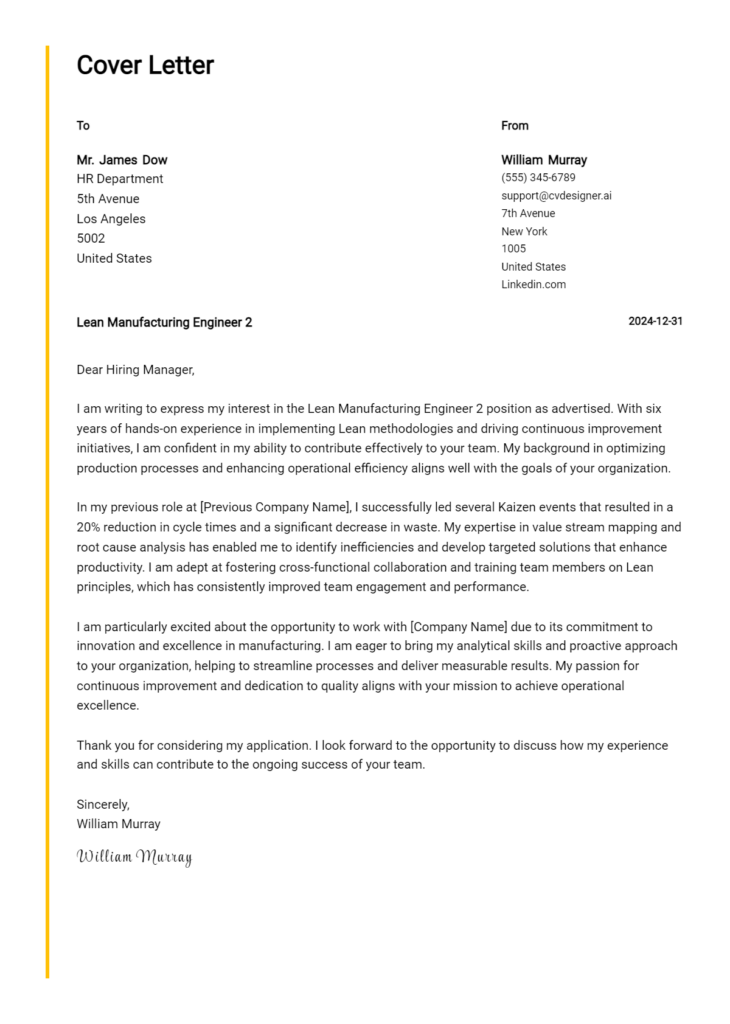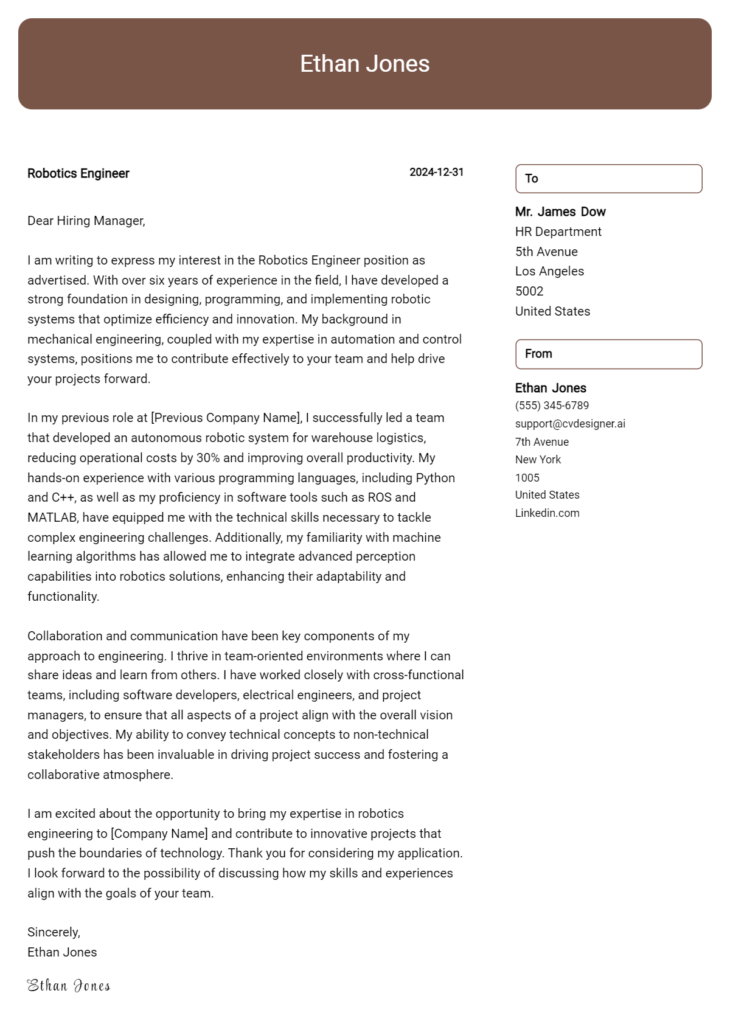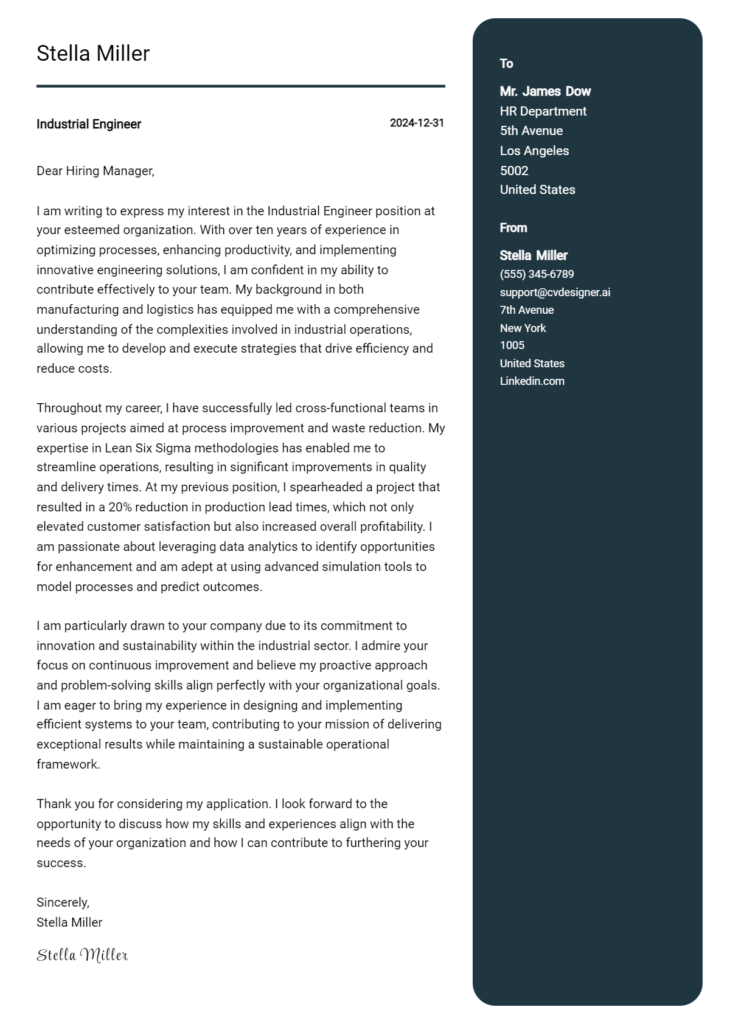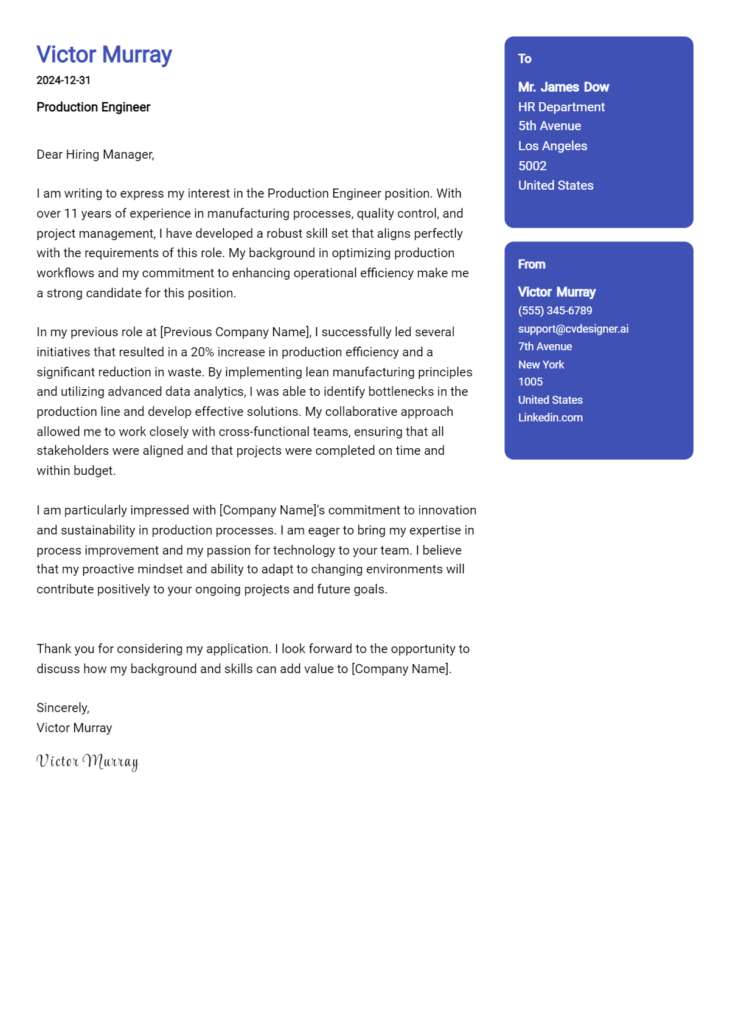Manufacturing Process Improvement Specialist Cover Letter Examples
Explore additional Manufacturing Process Improvement Specialist cover letter samples and guides and see what works for your level of experience or role.
How to Format a Manufacturing Process Improvement Specialist Cover Letter?
Crafting a compelling cover letter is essential for a Manufacturing Process Improvement Specialist, as it not only showcases your qualifications but also reflects your ability to analyze and enhance operational efficiencies. The way you format your cover letter speaks volumes about your meticulous nature and commitment to continuous improvement—crucial traits in the manufacturing sector. A well-structured cover letter can capture the attention of hiring managers, demonstrating your understanding of process optimization while emphasizing your problem-solving skills.
In this guide, we will discuss how to effectively structure your cover letter, providing insights and industry-specific examples to help you create a persuasive document.
We will focus on the essential components of a professional cover letter, including:
- Cover Letter Header
- Cover Letter Greeting
- Cover Letter Introduction
- Cover Letter Body
- Cover Letter Closing
Each section is pivotal in highlighting your qualifications and professionalism. Let’s delve into each part and explore how to make your cover letter stand out in the competitive field of manufacturing process improvement.
Importance of the Cover Letter Header for a Manufacturing Process Improvement Specialist
A well-structured cover letter header is crucial for a Manufacturing Process Improvement Specialist as it sets the tone for professionalism and organization. The header should include your contact information, the date, and the recipient's details, ensuring that your application is easily identifiable and accessible. Clarity in this section reflects your attention to detail, which is essential in manufacturing roles where precision is key. A strong header not only conveys your professionalism but also makes a positive first impression on hiring managers who are reviewing numerous applications.
Strong Example
John Doe 123 Industrial Way Manufacturing City, ST 12345 john.doe@email.com (123) 456-7890 October 1, 2023 Jane Smith Hiring Manager XYZ Manufacturing Corp 456 Factory Lane Production Town, ST 67890
Weak Example
john doe email: johndoe@email.com 10/1/23 to whom it may concern
The Importance of the Cover Letter Greeting
The greeting in a cover letter plays a crucial role in establishing the tone for the entire correspondence. A well-crafted greeting demonstrates professionalism and sets a personalized touch by addressing the hiring manager directly. It creates an immediate connection and signals that you have done your homework, showing respect for the recipient. To avoid generic greetings, take the time to research the hiring manager's name if it's available. A personalized greeting can significantly enhance the impression you leave, while a vague or generic one might suggest a lack of enthusiasm or effort.
Strong Greeting Example
Dear Ms. Johnson,
Weak Greeting Example
To Whom It May Concern,
Importance of a Well-Crafted Cover Letter Introduction for a Manufacturing Process Improvement Specialist
An engaging introduction in a cover letter is crucial for a Manufacturing Process Improvement Specialist, as it sets the tone for the entire application and provides an immediate impression to the hiring manager. This first paragraph should not only capture attention but also convey genuine interest in the role while briefly showcasing key skills or achievements relevant to process improvement. A strong introduction can differentiate a candidate from others in a competitive job market, while a weak one may fail to pique interest or convey the candidate's qualifications effectively.
Strong Example
Dear [Hiring Manager's Name], I am excited to apply for the Manufacturing Process Improvement Specialist position at [Company Name], where my extensive experience in lean manufacturing and process optimization can contribute to enhanced efficiency and reduced costs. With over five years of hands-on experience in implementing Kaizen methodologies and driving continuous improvement projects that resulted in a 20% increase in production efficiency, I am eager to bring my passion for operational excellence to your esteemed team.
Weak Example
To Whom It May Concern, I would like to apply for the Manufacturing Process Improvement Specialist job. I have worked in manufacturing for a few years and think I would be a good fit. I am not sure what specific skills I have that would help but I am willing to learn.
Cover Letter Body for Manufacturing Process Improvement Specialist
The body of a cover letter for a Manufacturing Process Improvement Specialist serves as a critical platform for candidates to articulate their qualifications, showcasing how their unique skills and experiences contribute to enhancing operational efficiency and productivity within an organization. It allows candidates to detail specific projects or accomplishments that demonstrate their capability in identifying process inefficiencies, spearheading improvement initiatives, and implementing effective solutions. By highlighting measurable outcomes, such as reduced waste or improved cycle times, the candidate can clearly communicate their value to potential employers, positioning themselves as a strong asset to the team.
Strong Example
In my previous role at XYZ Manufacturing, I led a project that focused on streamlining the assembly line processes, resulting in a 20% reduction in production time and a significant decrease in operational costs. By utilizing Lean Six Sigma methodologies, I conducted a thorough analysis of the workflow and implemented targeted improvements. These changes not only enhanced productivity but also increased employee satisfaction, as the new processes reduced repetitive tasks. I am excited about the opportunity to bring my expertise in process optimization to your team, further driving efficiency and innovation at ABC Corp.
Weak Example
I have worked in manufacturing for several years and have some experience with process improvement. I think I would be a good fit for your company. I have tried to make things better in my previous jobs, but I don't have any specific examples to share. I believe that I can help your team with improvements because I am hardworking and dedicated.
Importance of the Cover Letter Closing for a Manufacturing Process Improvement Specialist
The closing paragraph of a cover letter is crucial as it encapsulates your qualifications, reinforces your enthusiasm for the role, and prompts the hiring manager to take the next steps, such as reviewing your resume or scheduling an interview. A strong closing encourages a positive impression and leaves the reader with a sense of your professionalism and eagerness. In contrast, a weak closing may fail to convey your enthusiasm or leave the reader uncertain about your fit for the position.
Strong Example
Thank you for considering my application for the Manufacturing Process Improvement Specialist position. With my extensive background in lean manufacturing and continuous improvement methodologies, I am excited about the opportunity to contribute to your team. I am eager to discuss how my skills can align with your goals and drive efficiency within your operations. I look forward to the possibility of an interview to further explore how I can add value to your organization.
Weak Example
I appreciate your time in reading my letter. I think I would be good for the job. If you want to talk, just let me know.
These tips will help candidates craft an effective cover letter for a Manufacturing Process Improvement Specialist position by emphasizing the critical skills and traits required in this role. It is crucial to showcase not only your technical skills and problem-solving abilities but also your knowledge of the Software Development Life Cycle (SDLC), your capacity to work collaboratively in teams, and your passion for continuous learning. A well-crafted cover letter can set you apart in a competitive job market.
Tips for Writing an Effective Cover Letter
Highlight Technical Skills: Clearly outline your technical skills relevant to manufacturing processes, such as Lean Manufacturing, Six Sigma, or other methodologies. Use specific examples from previous roles to demonstrate how you applied these skills to improve efficiency and reduce waste.
Showcase Problem-Solving Abilities: Detail instances where you identified challenges in manufacturing processes and implemented effective solutions. Use metrics to quantify your impact, such as increased production rates or reduced defect rates, to provide tangible evidence of your capabilities.
Emphasize SDLC Knowledge: If applicable, illustrate your understanding of the Software Development Life Cycle and how it relates to manufacturing processes. Discuss experiences where you collaborated with IT or engineering teams to integrate software solutions that enhanced operational efficiency.
Demonstrate Teamwork: Manufacturing often requires collaboration across various departments. Share examples of successful team projects you’ve led or participated in, focusing on how your contributions facilitated improved processes or outcomes. This will highlight your ability to work harmoniously with diverse teams.
Express a Passion for Continuous Learning: Convey your commitment to ongoing professional development. Mention any training, certifications, or courses you have completed that enhance your qualifications as a Manufacturing Process Improvement Specialist. This shows employers your dedication to staying updated in the field and adapting to new methodologies.
For additional resources, you can explore cover letter templates or utilize a cover letter builder to help structure your application effectively.
Common Mistakes to Avoid in a Manufacturing Process Improvement Specialist Cover Letter
Crafting an effective cover letter is vital for standing out in the competitive field of manufacturing process improvement. Avoiding common pitfalls can significantly enhance your chances of making a positive impression. Here are some common mistakes to steer clear of when writing your cover letter:
Generic Content: A cover letter that lacks specificity can come across as insincere. Tailor your letter to the specific role and company by highlighting relevant experiences and skills.
Ignoring the Job Description: Failing to align your qualifications with the job requirements can weaken your application. Carefully read the job description and incorporate keywords and phrases that reflect your expertise.
Overly Formal Language: While professionalism is essential, using overly formal or complex language can create distance. Aim for a conversational tone that still conveys your professionalism.
Neglecting to Highlight Achievements: Simply listing responsibilities without showcasing your accomplishments can leave your cover letter flat. Use quantifiable results to demonstrate your impact in previous roles.
Poor Formatting: A cluttered or unprofessional layout can detract from your message. Follow a clear cover letter format to ensure readability and visual appeal.
Typos and Grammatical Errors: Submitting a letter with mistakes can signal a lack of attention to detail. Always proofread your cover letter or have someone else review it before sending.
Failing to Include a Call to Action: Concluding without a strong call to action may leave your letter feeling incomplete. Encourage the reader to contact you for further discussion to express your enthusiasm for the role.
By being mindful of these common mistakes and using resources like cover letter examples for inspiration, you can create a compelling cover letter that effectively showcases your qualifications as a Manufacturing Process Improvement Specialist.
Cover Letter FAQs for Manufacturing Process Improvement Specialist
What should I include in my cover letter for a Manufacturing Process Improvement Specialist position?
When crafting your cover letter for a Manufacturing Process Improvement Specialist role, focus on highlighting your relevant skills and experiences. Begin with a strong introduction that captures the reader's attention. Include specific examples of how you have successfully implemented process improvements in previous roles, emphasizing metrics like efficiency gains or cost savings. Discuss your familiarity with lean manufacturing methodologies, Six Sigma, or any other relevant frameworks. Additionally, demonstrate your problem-solving abilities and your capacity for teamwork, as collaboration is often key in manufacturing settings. Finally, express your enthusiasm for the specific company and its mission, showing that you've done your research.
How can I tailor my cover letter to the specific company I'm applying to?
To tailor your cover letter effectively, begin by researching the company’s values, goals, and recent projects related to manufacturing processes. Mention the company by name and refer to specific initiatives or challenges they are facing in the industry. Relate your skills and experiences directly to these points. For instance, if the company is focusing on sustainability, highlight your experience in implementing eco-friendly manufacturing practices. Use keywords from the job description to align your qualifications with their needs. This personalized approach not only demonstrates your genuine interest but also shows that you understand the unique challenges the company faces, setting you apart from other candidates.
How do I demonstrate my problem-solving skills in my cover letter?
To effectively demonstrate your problem-solving skills in your cover letter, use the STAR method (Situation, Task, Action, Result) to outline specific challenges you faced in past roles. Describe a situation where you identified a process inefficiency or quality issue. Explain the task at hand, the actions you took to address the problem, and the measurable results achieved, such as improved production rates or reduced waste. This structured approach allows you to clearly convey your thought process and highlight your analytical abilities. Furthermore, emphasize your ability to work collaboratively with cross-functional teams to solve complex issues, illustrating your team-oriented problem-solving approach.
What common mistakes should I avoid when writing my cover letter?
When writing your cover letter, avoid generic templates that lack specificity; personalize your letter for each application. Ensure that you don’t simply restate your resume; instead, use the cover letter to provide insights into your motivations and relevant experiences. Avoid overly technical jargon unless it is common in the industry; clarity is key. Additionally, steer clear of negative language or complaints about previous employers, as this can create a poor impression. Lastly, proofread your letter to eliminate any grammatical errors or typos, as these can undermine your professionalism and attention to detail, crucial qualities for a Manufacturing Process Improvement Specialist.
Build your Cover Letter in minutes
Use an AI-powered cover letter builder and have your letter done in 5 minutes. Just select your template and our software will guide you through the process.

